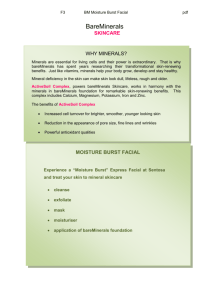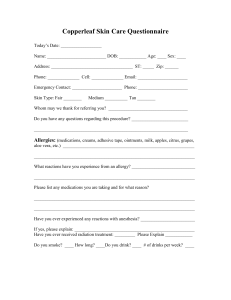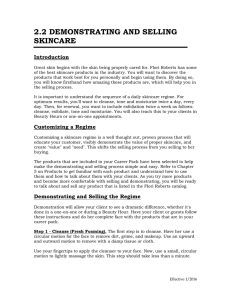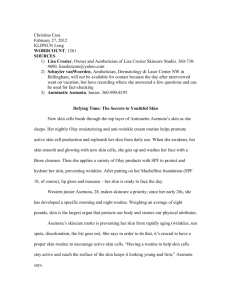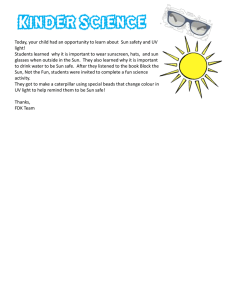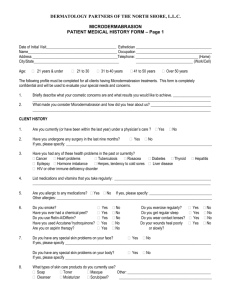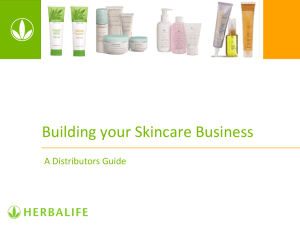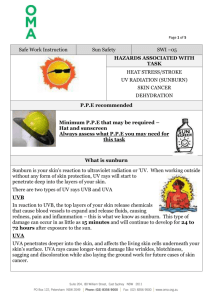Notes on Skin Care
advertisement
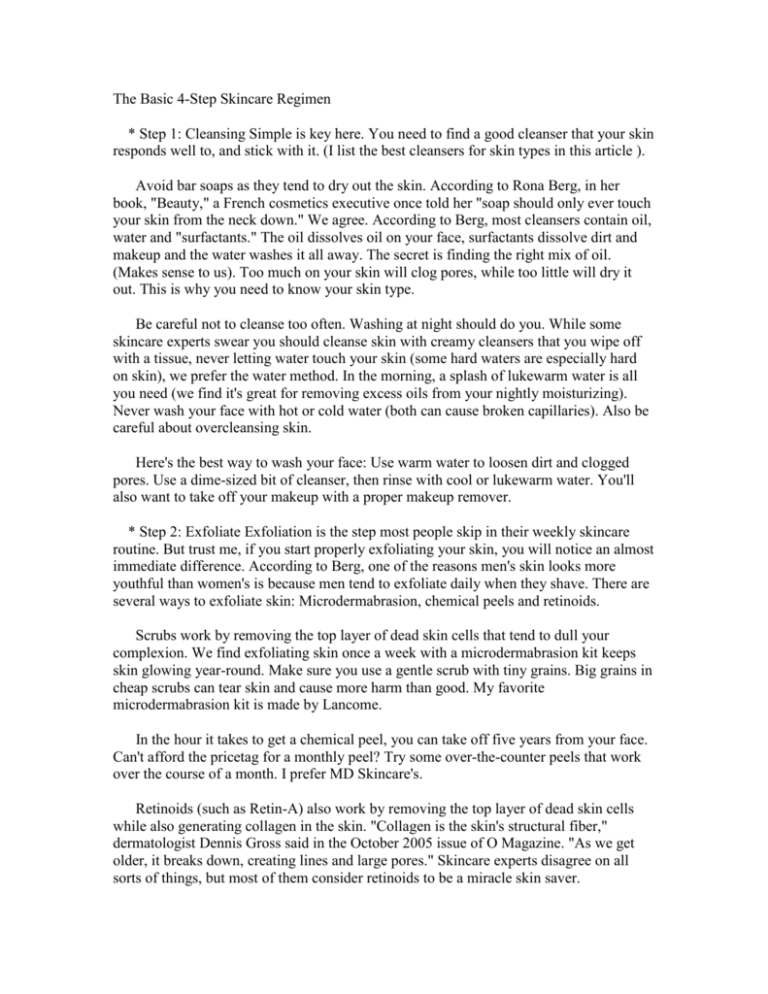
The Basic 4-Step Skincare Regimen * Step 1: Cleansing Simple is key here. You need to find a good cleanser that your skin responds well to, and stick with it. (I list the best cleansers for skin types in this article ). Avoid bar soaps as they tend to dry out the skin. According to Rona Berg, in her book, "Beauty," a French cosmetics executive once told her "soap should only ever touch your skin from the neck down." We agree. According to Berg, most cleansers contain oil, water and "surfactants." The oil dissolves oil on your face, surfactants dissolve dirt and makeup and the water washes it all away. The secret is finding the right mix of oil. (Makes sense to us). Too much on your skin will clog pores, while too little will dry it out. This is why you need to know your skin type. Be careful not to cleanse too often. Washing at night should do you. While some skincare experts swear you should cleanse skin with creamy cleansers that you wipe off with a tissue, never letting water touch your skin (some hard waters are especially hard on skin), we prefer the water method. In the morning, a splash of lukewarm water is all you need (we find it's great for removing excess oils from your nightly moisturizing). Never wash your face with hot or cold water (both can cause broken capillaries). Also be careful about overcleansing skin. Here's the best way to wash your face: Use warm water to loosen dirt and clogged pores. Use a dime-sized bit of cleanser, then rinse with cool or lukewarm water. You'll also want to take off your makeup with a proper makeup remover. * Step 2: Exfoliate Exfoliation is the step most people skip in their weekly skincare routine. But trust me, if you start properly exfoliating your skin, you will notice an almost immediate difference. According to Berg, one of the reasons men's skin looks more youthful than women's is because men tend to exfoliate daily when they shave. There are several ways to exfoliate skin: Microdermabrasion, chemical peels and retinoids. Scrubs work by removing the top layer of dead skin cells that tend to dull your complexion. We find exfoliating skin once a week with a microdermabrasion kit keeps skin glowing year-round. Make sure you use a gentle scrub with tiny grains. Big grains in cheap scrubs can tear skin and cause more harm than good. My favorite microdermabrasion kit is made by Lancome. In the hour it takes to get a chemical peel, you can take off five years from your face. Can't afford the pricetag for a monthly peel? Try some over-the-counter peels that work over the course of a month. I prefer MD Skincare's. Retinoids (such as Retin-A) also work by removing the top layer of dead skin cells while also generating collagen in the skin. "Collagen is the skin's structural fiber," dermatologist Dennis Gross said in the October 2005 issue of O Magazine. "As we get older, it breaks down, creating lines and large pores." Skincare experts disagree on all sorts of things, but most of them consider retinoids to be a miracle skin saver. Should you use a toner? Some people swear by toners, but many beauty experts do not (I once read a skincare expert claim, 'toners are only for copy machines'). Toners are meant to remove all remaining traces of oil, makeup and dirt, but a good cleanser should do this. I firmly believe it's up to you. If you like the way your skin feels with a toner. Buy it. Use it. Enjoy it. * Step 3: Moisturize While I know of at least one famous beauty editor who swore skin doesn't need moisturizer, basically everyone else I've read disagrees and is an adamant believer in it. A basic law of beauty is that everyone, no matter her skin type, should moisturize. Even if your skin is oily, it will benefit from moisturizers. (The only exception is those with acne). Why? Moisturizers seal moisture into skin (Berg calls this the 'Saran Wrap effect'). So how much should you moisturize? Your skin will tell you. When your skin is tight, it's crying out for moisture. Be careful not to overmoisturize -this can cause clogged pores. For the skinny on great moisturizers for your skin type, check out this article. Are eye creams necessary? Well maybe. Some beauty experts strongly recommend eye creams. Why? The skin around the eye contains no fatty tissue and is therefore very thin and susceptible to wrinkles. Special eye creams are formulated to 'thicken' this area and keep it sturdy. Yet other experts (including the beauty editors of Allure in their new book) claim your daily lotion works around the eyes just as well. # Step 4: Apply sunscreen 'O' magazine ran an article in November 2006 featuring interviews with several top skin care experts and dermatologists (check it out here ). Every single one of them said sunscreen was the most important part of your skincare regimen. It was the secret they would pass on to their daughters. The number 1 cause of wrinkles is sun damage, so it's important to use sunscreen from your early years on even in winter and on cloudy days. A great trick is to purchase two moisturizers: one for night and one for day that includes UV protection. Don't use moisturizers with sunscreen at night, the ingredients are not meant to be used 27/7 and can aggravate skin. When choosing a sunscreen, make sure it contains 1 of 3 ingredients as an 'active ingredient': titanium dioxide, zinc oxide or Parsol 1789 (avobenzene). 10 to 15 minutes per day in the sunshine. Wear a hat to protect your face. Expose arms and legs. Smoking and stress contribute to premature aging. Desert Blends Desert Blends of Taos manufactures personal care products using an Ayurvedic blend of infused, wildcrafted sage and herbal extracts from the mountains and high desert. According to founder, there are many indigenous New Mexico plants that offer natural sun protection and moisture retention, and they have just developed a moisture cream made from these locally grown and wild crafted plants that have developed natural sun protection and moisture retaining properties because they thrive in this climate. Burdock root full is full of calcium, iron and zinc offering natural SPF protection. Chapparelle is a natural cancer preventative and evening primrose is full of omegas. Desert Blend products use no compounds, fillers or synthetics, and these all natural and organic products build immunity and provide antibacterial properties that enhance skin health. "Skiing in the high desert is extra harsh on the skin because of our dry climate. Special care needs to be taken for even short exposures to the elements during skiing. A high-quality natural sunscreen and proper hydration are the bare minimum. It is also important to renourish the skin with natural products after exposure to the elements. I can't stress the importance of using all-natural products on your skin. Recently, many people have become conscious about what they put into their bodies. It is equally important to be conscious about what we put on our bodies. It is important for skiers to restore moisture to dry, chapped skin after a long day in the cold, wind, and sun. At Conscious Health, I handblend skin moisturizers with herbs and essential oils that are known for their regenerative and emollient properties. My moisturizers are so rejuvenating that they can actually eliminate fine lines and wrinkles." Megan Connell, Licensed Massage Therapist and co-owner of Conscious Health
